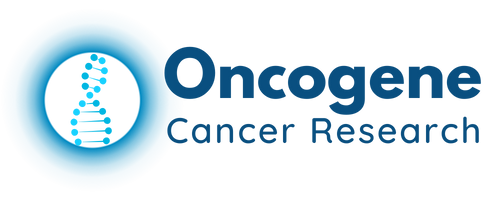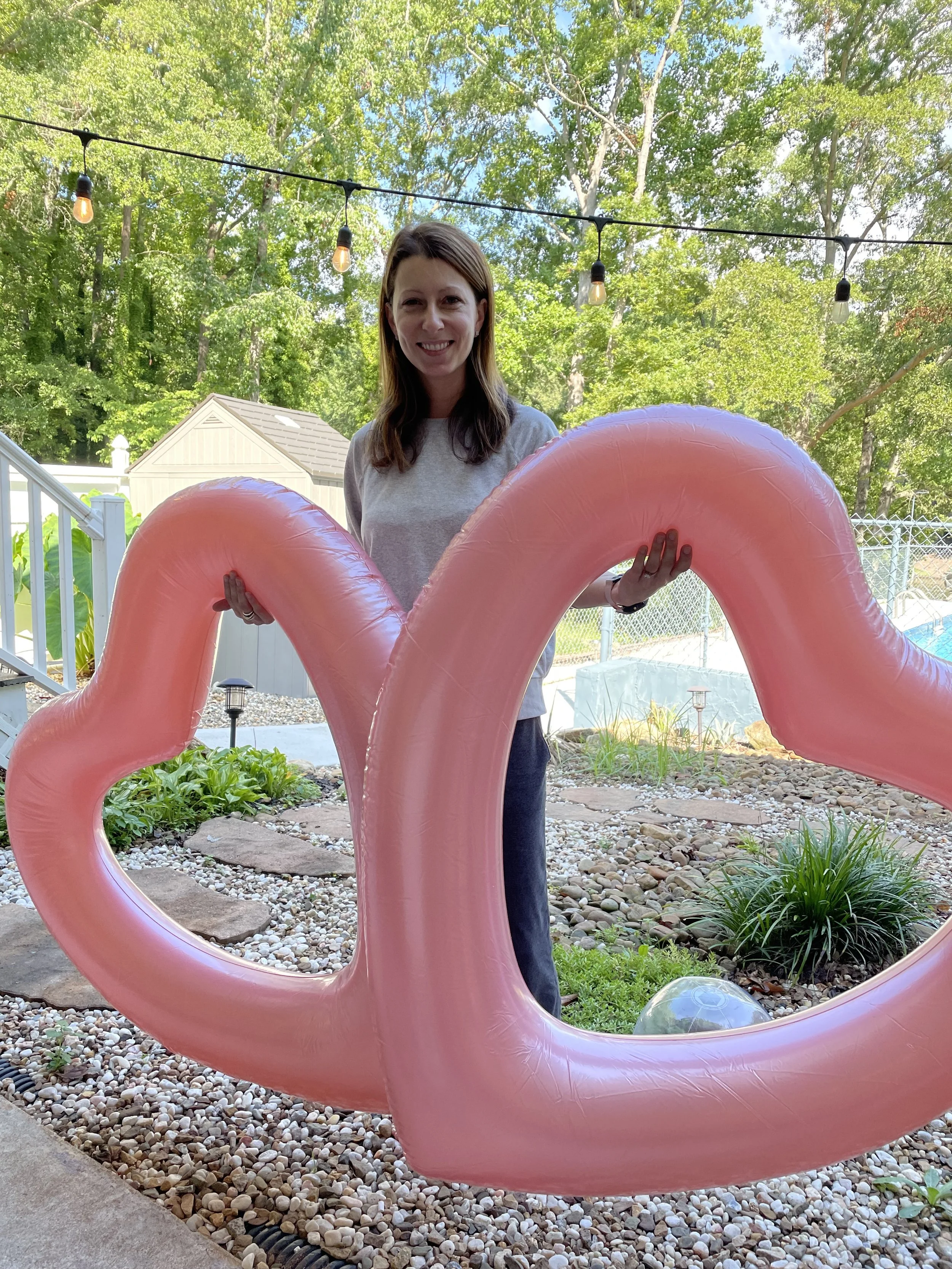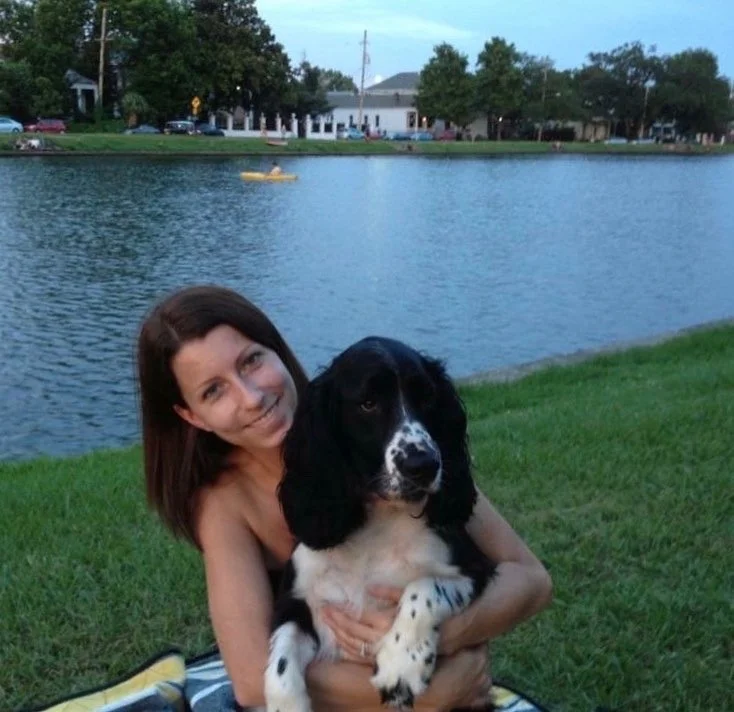Patient stories.

Remember that medical science keeps marching forward at an increasingly rapid pace.
— Emily Walthall (R), living with stage IV, RET-positive lung cancer, with husband Elliott
Emily’s story
If you were 10 years older and had a smoking history, we’d biopsy that mass right away; but you don’t have lung cancer.
Life in in beautiful Brevard, North Carolina was great for Emily. She enjoyed nature walks with her husband Elliott and English Setter, Luna, as well as travelling near home and abroad.
One day in November 2021, Emily woke up with a “catch” in her throat and found she could not draw a full, deep breath. Within a week, she started having coughing fits – sometimes to the point of gagging. While Emily had not experienced a fever, she went to an urgent care centre shortly before going home to see her parents for Christmas and tested negative for the flu and Covid. However, none of her symptoms improved. The week after Christmas, Emily went to a primary care doctor and scans showed a spiculated (or spiky) mass in her upper right lobe and “ground glass” opacities in both lungs. She was told she had double pneumonia.
Emily asked the doctor if they should biopsy the mass, to which he responded, “If you were 10 years older and had a smoking history, we’d biopsy that mass right away; but you don’t have lung cancer.”
“I was totally unconcerned because I thought only smokers got lung cancer,” Emily adds.
You don’t fit the lung cancer profile
We had been expecting a routine follow-up report. We were completely shocked.
Emily with her English Setter Luna
Weiss at UNC-Chapel Hill. Throughout February 2022, we also sought several additional opinions, but Dr Weiss was ultimately the right fit and oncologist we chose. He immediately started talking about next-generation sequencing (NGS) and targeted therapies, which was our first time ever hearing about either. However, we felt we were in good hands.”
Emily underwent a bronchoscopy, in which tissue taken was biopsied and tested for oncogenes using NGS. Three weeks later, on a March evening at 10.00pm, Emily received a call from the oncologist. Emily shares, “My oncologist said he was sorry to call at this hour, but he had just read our NGS report and knew we wouldn’t want to wait. He said, ‘You have RET!’ He explained that there is an excellent targeted therapy that he wanted me to start on right away and added that we should have a glass of champagne!”
“My husband and I just cried tears of gratitude. We had so much hope now. We knew that an oncogene diagnosis like RET lung cancer had major positive implications for my quality of life and treatment path.”
Four weeks later, given the “pneumonia” symptoms hadn’t improved, Emily went for a follow-up CT-scan. She says, “That evening, in line with US medical record disclosure practices, I received an email with the radiologist’s report. It noted four different findings, including the growth of original mass and the appearance of new nodules that ‘should be considered malignant unless proven otherwise.’ It was after business hours on a Thursday evening, so we couldn’t call or speak with anyone. We had been expecting a routine follow-up report for my pneumonia diagnosis. We were completely shocked.”
While Emily and her husband had no real knowledge of cancer, they knew that due to her age, 39 at the time, and lack of known lung cancer risk factors, they needed to get themselves to a comprehensive cancer centre. Emily adds, “In North Carolina, we are
very fortunate to have three. I met with an oncologist the following week - Dr Jared
Emily with Chris Draft, former NFL footballer and campaigner for The White Ribbon Project
A path forward
RET-positive (or rearranged during transfection) lung cancer is more common in younger patients who have never or rarely smoked. These abnormal fusions of the RET gene occur in about 2% of all lung adenocarcinomas – about 37,500 people globally each year. Thanks to advances in research and precision medicine, RET lung cancer is treated with targeted therapies. These oral medications inhibit the cancer from growing, but do not cure it. The unfortunate fact is that over time people with RET lung cancer develop resistance to their medications, need to transition to other treatments and eventually run out of treatments – highlighting the need for further research.
Emily is now two years into her first line treatment called Retevmo (or selpercatinib)– a RET targeted therapy. She finds that her energy, ability to breath fully and strength are essentially what they were before life with cancer, highlighting the quality of life that targeted therapies bring to patients. Emily does experience a few mild side effects that come and go, but they are very manageable.
Today, Emily’s day-to-day life is very similar to what it was before cancer, except that with stage IV, she’s not in full-time employment. Instead, she dedicates her time and energy towards supporting her lung cancer community, creating lung cancer awareness, and advocating for research. Emily is an active Board Member of RETpositive, a US-registered charity fundraising for more research and focused on supporting patients with all RET-driven cancers, regardless of tissue of origin. She’s also been a great support and active member of Oncogene Cancer Research. Given that 85% of RET lung cancer patients will not have a RET-driver mutation at progression, Emily is keen to see more research across all the oncogene-driven lung cancers.
Emily says, “In many ways, I still feel a continuity with the life I was living before my diagnosis; it’s rich with loving family and friends, learning, and humour. An important part of my healing journey involves remaining connected with the person I’ve always been, even in the face of trauma, while also seeking out new experiences and joy. I do not mean that in a “toxic positivity” sense or by insisting that everything is “fine” or avoiding sitting with pain, fear, or grief. However, it’s important to me to find purpose and hopefully keep growing as a person in response to the trauma of a cancer diagnosis.”
Emily with husband Elliott
Advice to anyone newly diagnosed
Emily advises anyone diagnosed to seek out a high-capacity institution or medical practice whose clinicians are engaged in cutting-edge medical research and treatment. There are excellent doctors in a range of settings, but Emily’s original, rural practice primary care doctor had no awareness at all of the rising lung cancer rates among younger never-smokers. She adds, “You are much more likely to receive a full, precise diagnosis, such as RET, ALK or another specific oncogene-driven diagnosis, verses a simple diagnosis of lung adenocarcinoma without additional oncogene testing. Higher-capacity medical institutions are
also more likely to have knowledge of and connection to clinical trials that may benefit you now or down-the-road.”
Emily’s family, friends and dog are a key part of her emotional and mental wellbeing. She also seeks out experiences that connect her with a sense of awe – whether being in nature, reading a good book or listening to music. Emily believes that emotional and mental support are key whether through formal counselling or patient/caregiver support groups. She adds, “You are not alone. There are many trained professionals and support groups who understand what you’re experiencing and can provide support. Life goes on after a diagnosis. You are resilient and adaptable. Also remember that medical science keeps marching forward at an increasingly rapid pace!”
As someone who is directly involved in raising and advocating for more funds for research, Emily adds that she hopes continued research can help turn metastatic lung cancer a chronic, manageable disease and one day even find a cure.
April 2024
Sally Hayton, living with stage IV ALK+ lung cancer since 2013
Have you been touched by an oncogene cancer?
While none of us ever expected an oncogene-driven cancer diagnosis, our personal stories inform the medical, research and pharma community on the issues we face. Our stories can also become someone else’s survival guide.
Please get in touch to share your story. This could be the beacon of hope someone desperately needs.







